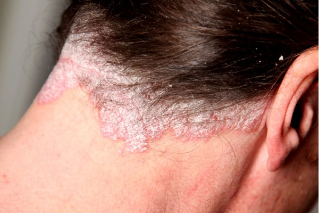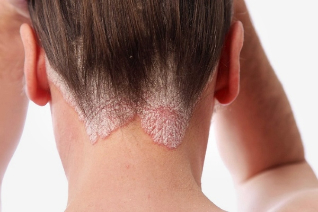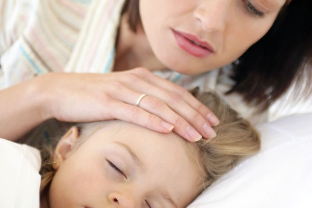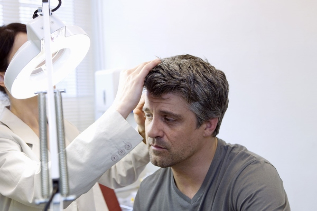Psoriasis is a skin infectious disease that occurs in 1 out of 100 people, with 80% of cases revealed the defeat of the scalp. It results in the formation of red plaques or spots, between which is visible to the intact skin. Inflammation can expand and unite with each other. Why does the psoriasis and as a cure, find out below.
A brief summary of the pathology

Psoriasis on the head is an autoimmune disease. This conclusion by the doctors was made after studies conducted in the plaques they found characteristic of autoimmune diseases changes, and therapy which suppress the immune system drugs significantly improve the General condition. The disease is not transmitted from a sick to a healthy person.
Psoriasis can affect anyone, but clinical experience allows to identify the main risk groups. Thus, the pathology often affects women, and inherited genetically form makes itself felt already in 15-25 years. Ill more than 50% of cases have relatives with psoriasis of one form or another. This means that the risk of such disorders is higher among those whose parents, brothers or sisters also have such a diagnosis. Psoriasis of the scalp, as a rule, can hit the following sites:
- partings;
- the upper part of the forehead;
- the area behind the ears;
- whiskey;
- the back of the head;
- the skin on the ears, including the ears;
- the arcs of the eyebrows.
Typically, such a psoriasis has a wave-like nature of the flow, i.e. involves alternating periods of improvement and exacerbation stages. While the affected areas appear red teardrop-shaped plaque with the contents of the sebaceous, which are periodically sloughed off and cause itching. This inflammatory process leads to serious health consequences, but also causes serious psychological problems. Very often there is a vicious circle in which psoriasis causes stress, and he, in turn, causes complications for the occurrence of pathology.
The disease itself does not cause hair loss, however temporary alopecia can lead some methods of therapy, stress or damage to the skin. Usually hair grow back after cleansing and stabilization of psychoemotional state.
Why is there?

Doctors still have not identified the exact causes that trigger inflammatory response and excessive synthesis of skin cells on the patient's body. At this point the leading hypothesis is genetic. It States that individuals have an innate tendency to accelerated upgrade of keratinocytes (the main cells of the epidermis of human skin). The manifestation of psoriasis such tendency causes a specific reaction of the immune system:
- The body begins to rapidly produce new cells that form psoriasis patches.
- A more serious inflammation of the skin in the affected area (the body treats it as something alien).
- The more damaged the skin under the influence of the immune system, the more active is the division of keratinocytes.
For a long time, genetic factors may be dormant, but it wakes up under the influence of adverse factors. These include:
- Stress. Changes in the nervous system cause disorders in all organs, including the skin. As a result, this leads to changes in the division of epithelial cells.
- Frequent trauma to the skin. They provoke failures in the process of division and growth of keratinocytes.
- Infectious diseases. The germs attack the human immune system, especially if the disease is chronic. As a result, the immune system is constantly in tension and begins to attack the epithelial cells.
- Dryness and skin sensitivity. In this case, the skin is often suffering from trauma, therefore, likely to develop psoriasis.
- Climatic conditions. When dry and cold air, the skin undergoes an increased load, therefore, possible violations, which will lead to psoriasis.
- Diseases of the endocrine system. They cause disruptions in the development of melatonin and provoke increased secretion of growth hormone.
Another popular hypothesis says that psoriasis develops due to violations of metabolism. In this case, the body specifically reacts to stimuli from rapidly dividing cells of the dermis. Normally, the skin is renewed within 3 weeks, the patients it occurs within 5 days, resulting in head there are numerous plaques. In this case, can provoke exacerbation of the following factors:
- injury of the scalp;
- emotional stress and stress;
- hormonal disturbances;
- diseases of the endocrine system;
- bad habits (Smoking, abuse of alcohol);
- infectious processes in the body;
- improper diet;
- the use of certain medication;
- hypothermia, or prolonged exposure to the cold;
- the use of low-quality care products for the scalp.
In some cases, the starting point for the development of psoriasis may be pathology of the immune system that may occur as a result of severe stress or infectious disease.
Revealed that HIV-positive suffer from psoriasis 3 case more often than healthy people.
As pathology is shown?
Psoriasis develops gradually and can be detected at different stages in the following processes:
- On the surface of the skin appear pink rash, which are rounded, and the top covered with numerous plaques in white.
- The lesions gradually grow and increase in diameter. As a result, they turn into thickened psoriatic plaques that cause itching and burning. Thereafter, a strong inflammatory process.
- Tissue grow excessively under the pressure of excessive reproduction of ectodermal cells in the plaques and excessive accumulation of lymphocytes and macrophages. This leads to thickening of the skin in the affected areas and the formation of red spots in the area of hair growth.
- The patient feels a General malaise and weakness. He could jump body temperature.
- The skin becomes sensitive, painful and more dense. Gradually, it loses elasticity, becomes rough and is covered with plaques which flakes quickly.
- When combing the scalp is covered with bleeding wounds and cracks.
- Plaques gradually shed, so the hair you can see the enormous layers that resemble dandruff.
- Itching becomes more intense and won't even let the person do the usual things.
- The person is depressed or constantly breaks down, feeling great aesthetic discomfort.
- Pathology is distributed throughout the scalp and other parts of the body.
To minimize the manifestations of psoriasis required when the first lesions on the head to contact a dermatologist to be examined and begin treatment.
Features symptoms in children

Psoriasis of the scalp, the child develops almost in the same way as in adults, but most often the disease makes itself felt such symptoms:
- redness of the scalp, which is seen even through the hair;
- wet softening of the skin, which in medicine is called maceration;
- desquamation of plaques;
- the formation of clusters of plaques in certain areas of the scalp.
The younger age group psoriasis often resembles a formation of diaper rash. The disease develops quite slowly and is difficult to treat.
Classification pathology
Psoriasis scalp is classified by two parameters - shape and stage of development. It depends on them what looks like a disease. Consider each parameter separately.
Form
The shape of the psoriasis is of two types:
- Easy. Mainly manifests itself on the head in the form of single lesions. Typically, the plaques are small and covered with thin plaques.
- Heavy. Psoriatic elements appear on the entire scalp. The size of the plaque and more and thickness than in mild severity of disease.
Stage
Experts identify three stages of pathology:
- Progressive. On the scalp new lesions. They usually affect the area in the contour of the hair growth. For psoriatic elements is peeling. Gradually, the Islands of the rash may unite, forming extensive areas of lesions. If the phase occurs during a recurrence of the disease, that already available elements are distributed on the periphery of what is called the phenomenon of Kebner.
- Stationary. The inflammatory process remains, but no new rash. This stage is characterized by the blunting of the growth of plaques and the absence of a hyperemic rim along the contour of the skin elements.
- Regressive. Reduced the volume of lesions, which indicates the effectiveness of the therapy. Gradually fade the available patches, which change the appearance of pigment spots. The patient no longer worried about peeling, itching and other symptoms of pathology.
Diagnosis

If there was a rash on the scalp, you need to consult a dermatologist. Additionally, it may be consulted with a specialist in hair treatment (officia) and a beautician, who will help you choose the shampoos and other care. The diagnosis of the disease plays a big role in identifying the psoriatic triad, which consists of such phenomena as:
- Stearic spots. Enhanced exfoliation, the platelets have a silvery color and resemble stearin.
- Psoriatic film. If you remove all the plaque, on their place will be wet glossy surface.
- Blood dew. When combing plaques will appear pixelated drip bleeding.
These symptoms allow the diagnosis already by visual inspection. The doctor takes into account the data history, including specify whether the patient relatives with psoriasis. To confirm the diagnosis, your doctor may order a biopsy (biopsy material from affected areas) and planting flora to exclude a fungal infection. In the case of generalized forms of psoriasis shall further the General analysis of blood. During intoxication it will show a high erythrocyte sedimentation rate (ESR) and elevated white blood cell count.
General medicine
Psoriasis of the scalp requires an individual treatment that will help relieve the unpleasant symptoms, and most importantly - to achieve long-term remission with any form of pathology. For these purposes, often appointed complex therapy. Each component deserves special attention.
It is aimed at the suppression of chronic inflammatory reactions and excessive formation de keratocytes, as that the pathological processes underlying the disease. As part of the overall therapy, the doctor may prescribe the following medications:
- means of nonspecific immunotherapy (Pirogenal, ATP);
- vitamin complexes;
- immunomodulators;
- aromatic retinoids (Etretinate, Acitretin);
- cytostatics;
- corticosteroids;
- solution Gemodeza intravenous drip injection.
Receiving cytotoxic drugs and corticosteroids is advisable in case of severe occurrence of psoriasis and a significant expression of symptoms on the scalp. If psoriasis is also complicated by the accession of infection, in the course of treatment of antibiotics are.
In the framework of the overall therapy the doctor may also prescribe antidepressants. They are necessary in order to reduce and eliminate related psoriasis psychological and emotional problems - depression, stress, increased anxiety and phobia socialis. Moreover, such drugs will improve patient's resistance to stress, reduce the frequency and severity of exacerbations of psoriasis on the background of nervous tension, improve sleep quality. Some drugs have antihistamine effect and, thus, also help relieve itching.























